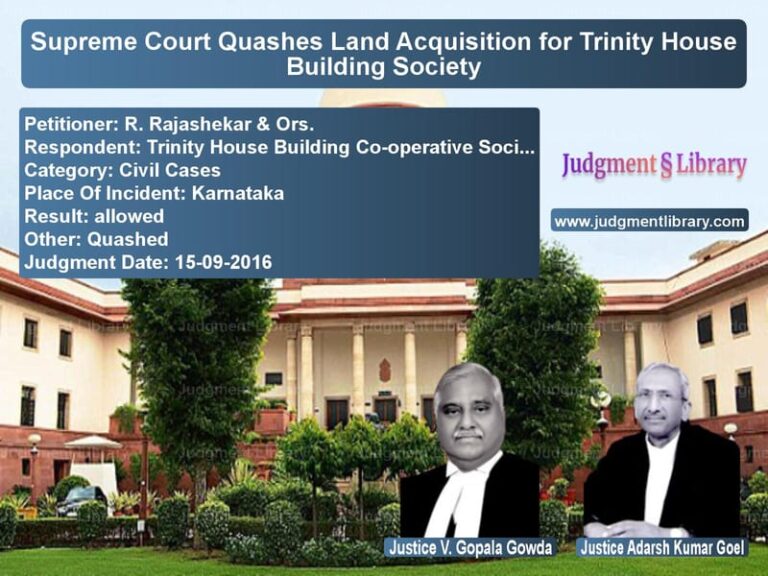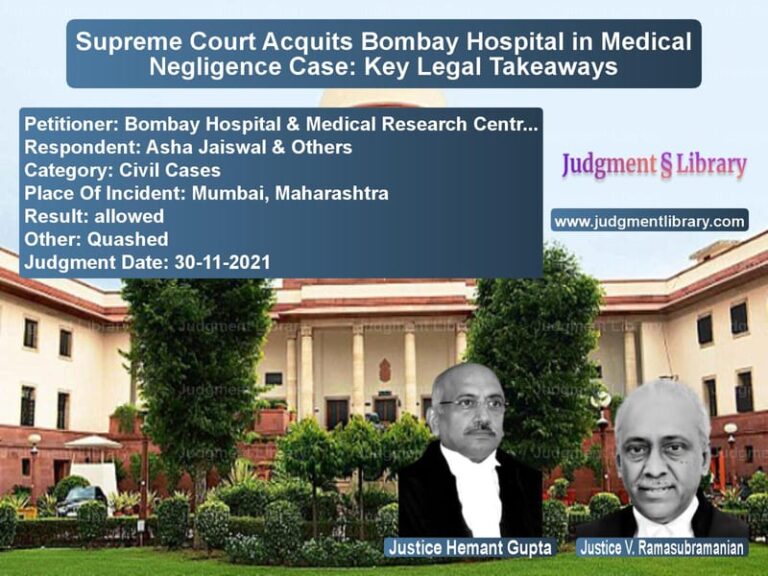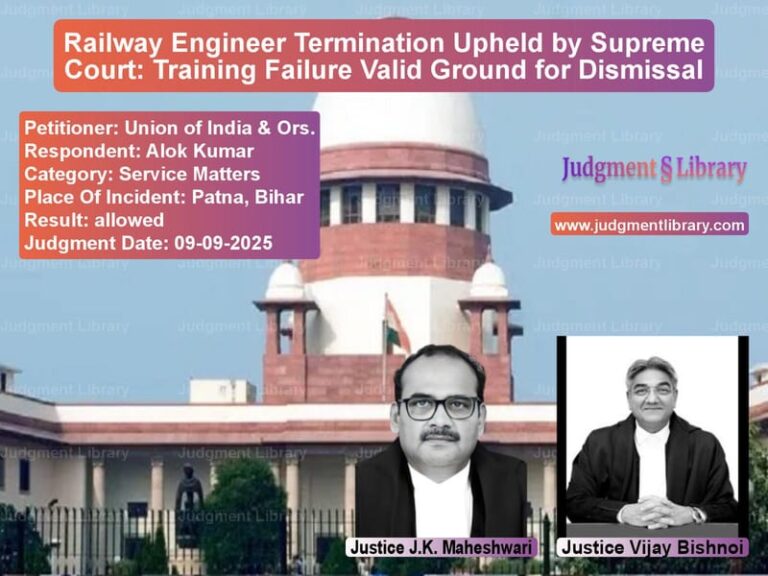Supreme Court Upholds Acquittal in Delhi Parcel Bomb Murder Case
The case of H.D. Sikand (D) Through L.Rs. vs. Central Bureau of Investigation & Anr. involved one of the most complex criminal trials in India, centering around the murder of businessman Kishan Sikand through a parcel bomb. The prosecution alleged that the crime was committed by Lt. Col. S.J. Chaudhary, the former husband of Rani Chaudhary, who was living with the victim. The case spanned over three decades, with multiple investigations and trials. The Supreme Court ultimately upheld the Delhi High Court’s decision to acquit the accused, ruling that the prosecution had failed to establish his guilt beyond reasonable doubt.
Background of the Case
The case dates back to October 2, 1982, when Kishan Sikand, a businessman living at 98, Sunder Nagar, New Delhi, was killed by a parcel bomb. The prosecution alleged that Lt. Col. S.J. Chaudhary, the former husband of Rani Chaudhary, was behind the attack. According to the prosecution, Lt. Col. Chaudhary had been deeply troubled by the fact that his ex-wife was living with Sikand. After failing to persuade her to return to him, he allegedly plotted to eliminate Sikand.
Marital Dispute and Divorce Proceedings
Lt. Col. Chaudhary and Rani Chaudhary had a tumultuous relationship. They were married in 1971, but their marriage soon fell apart due to allegations of physical abuse and mental harassment. Rani filed for divorce under Section 13(1)(1a) of the Hindu Marriage Act, and an ex-parte decree of divorce was granted in her favor on December 6, 1979. Chaudhary, however, appealed the decree in the Delhi High Court and simultaneously filed a petition to restrain Rani from remarrying.
Despite his legal maneuvers, the courts ultimately upheld the divorce, and Rani began living with Sikand. This reportedly enraged Chaudhary, who was alleged to have sent multiple threats to both Rani and Sikand.
Crime and Initial Investigation
On the morning of October 2, 1982, a parcel was found on the staircase leading to Sikand’s residence. When he opened it, the package exploded, killing him instantly. The Delhi Police began an investigation but struggled to find concrete leads. The case was later handed over to the Central Bureau of Investigation (CBI) in 1983.
The CBI built its case on circumstantial evidence, arguing that:
- Lt. Col. Chaudhary had repeatedly threatened to harm Sikand.
- He had access to explosives due to his military background.
- A witness allegedly saw him near the victim’s residence days before the explosion.
- The handwriting on the parcel label matched a typewriter used by the accused.
Based on these findings, the CBI arrested Lt. Col. Chaudhary and charged him with murder under Section 302 of the Indian Penal Code (IPC) and under Sections 3 and 4 of the Explosive Substances Act, 1908.
Trial Court’s Verdict
The Additional Sessions Judge, Delhi, convicted Chaudhary and sentenced him to life imprisonment for murder, along with rigorous imprisonment of 10 years under the Explosive Substances Act. The trial court relied heavily on circumstantial evidence, ruling that the chain of events pointed conclusively to Chaudhary’s guilt.
Appeal to the High Court
Chaudhary appealed his conviction in the Delhi High Court, which overturned the verdict. The High Court’s key findings were:
- The case was based entirely on circumstantial evidence, which did not conclusively establish guilt.
- The CBI failed to provide direct evidence linking the accused to the bomb.
- The witness who allegedly saw the accused near the crime scene came forward almost a year later, raising doubts about credibility.
- The forensic evidence did not definitively match the parcel bomb to any materials possessed by the accused.
Based on these considerations, the High Court acquitted Chaudhary in 2009.
Supreme Court’s Judgment
The case was then brought before the Supreme Court by the deceased’s father, H.D. Sikand, who sought a reversal of the High Court’s acquittal. The Supreme Court, however, upheld the acquittal, ruling:
“The prosecution has failed to pass the necessary tests required to establish guilt beyond reasonable doubt. Circumstantial evidence must form a complete chain, leaving no room for alternative explanations. In this case, the evidence was insufficient to conclusively establish the accused’s involvement.”
The Court made several key observations:
- The chain of circumstantial evidence was incomplete and left significant gaps.
- The credibility of key witnesses was questionable, as statements were delayed.
- The forensic evidence did not conclusively establish a link between the accused and the explosive device.
- The prosecution had failed to meet the burden of proof required in criminal cases.
Impact of the Judgment
The Supreme Court’s ruling in this case reaffirmed the principle that an accused cannot be convicted based on suspicion or incomplete circumstantial evidence. The decision highlights key legal principles:
- In criminal cases, the prosecution must establish guilt beyond reasonable doubt.
- Circumstantial evidence must be strong enough to rule out all alternative possibilities.
- Judicial scrutiny in cases involving serious charges must be stringent to prevent wrongful convictions.
Conclusion
The Supreme Court’s judgment underscored the importance of due process and fair trial principles. While the case involved a tragic loss of life, the Court reiterated that legal procedures must be upheld to ensure justice. The acquittal of Lt. Col. Chaudhary serves as a reminder that in criminal cases, suspicion alone cannot be a substitute for concrete and compelling evidence.
Don’t miss out on the full details! Download the complete judgment in PDF format below and gain valuable insights instantly!
Download Judgment: H.D. Sikand (D) Thro vs Central Bureau of In Supreme Court of India Judgment Dated 15-12-2016.pdf
Direct Downlaod Judgment: Direct downlaod this Judgment
See all petitions in Murder Cases
See all petitions in Judgment by Pinaki Chandra Ghose
See all petitions in Judgment by Amitava Roy
See all petitions in dismissed
See all petitions in Declared Infructuous
See all petitions in supreme court of India judgments December 2016
See all petitions in 2016 judgments
See all posts in Criminal Cases Category
See all allowed petitions in Criminal Cases Category
See all Dismissed petitions in Criminal Cases Category
See all partially allowed petitions in Criminal Cases Category







